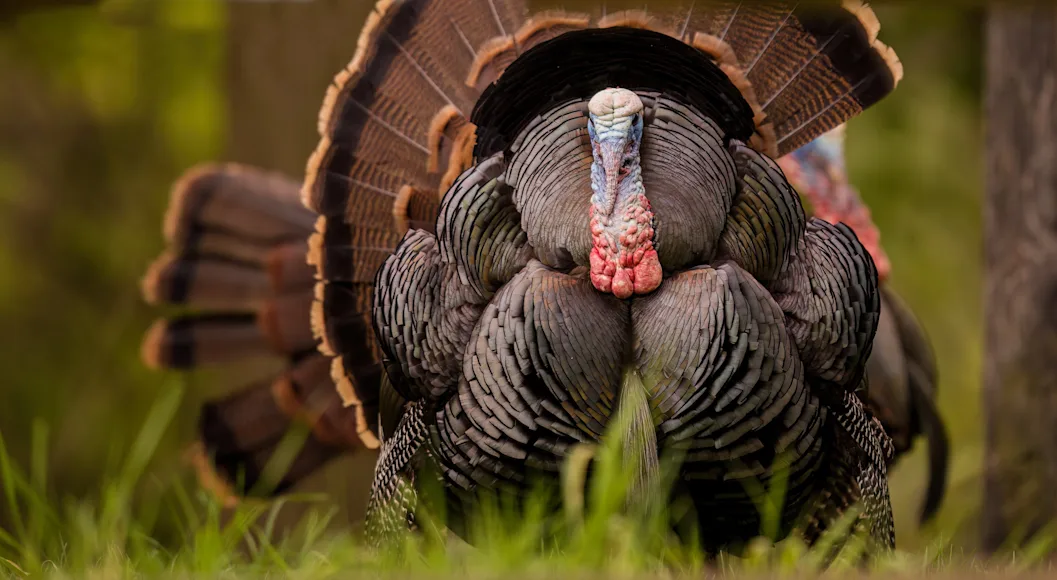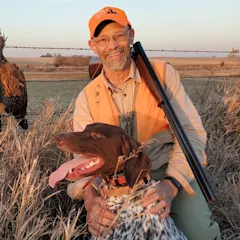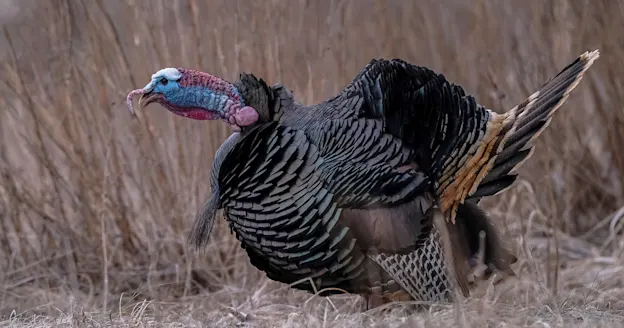SPRING TURKEY SEASON comes only once a year, meaning you have a full eleven months to forget all the lessons you had to relearn last season. So far, in a week of hunting, I’ve had the following lessons painfully beaten back into my head:
Never underestimate the cold of an Upper Midwestern morning in late April. Even when I take more layers “just in case” I don’t take enough. Also, if I sit on the shady side of a tree, as one should, the sun cannot warm me.
When it comes to now-or-never shots in the woods, “now” always turns into “never” faster than I think it will.
Call to a turkey that can see you, and it will walk away. The real superpower of turkeys is knowing exactly where a sound comes from.
It would be better to have the last-day jake I chose not to shoot in the freezer than it is to have an expired tag in my pocket.
After an ego-bruising and sleep-deprived week, it’s not turkeys I hate. Turkeys aren’t sneaking into the house and setting my alarm for 3:45. They would just as soon rather I stayed in bed. Turkey hunting, on the other hand? Yeah, I hate that sometimes. There is only so much frustration I need.
Nevertheless, after a day off, I am up early, fresh tag in my pocket, ready to start pushing the rock up the hill again. As part of my reset, I am trying a place I’ve never hunted. On paper, it should have turkeys. It’s a narrow strip of soft maples 150 yards at its widest, connecting two bigger, hardwood river-bottom blocks of timber half a mile apart. I can’t hunt either of the big-woods lots, but people shoot turkeys in both of them. It stands to reason that birds must sometimes use the skinny woods to pass from one larger patch of timber to the next.
Love-Hate Relationship
My plan is solid and unexciting. I will take a comfortable ground-level chair, plus snacks and drinks, and sit until noon. I’ll set up with my back to a levee, facing toward the river, with a commanding view all the way across the woods. Any bird passing from either direction by will be in easy calling range. Nothing will sneak up behind me. I’ve got a calm, clear morning to hunt, a spring day so perfect for sitting by a tree that I can forget all about how much I hate turkey hunting for a while, even if nothing happens today.
Just as I sit down, a roosted turkey starts gobbling upriver, two or three hundred yards away. I have been at this for far too many years to get over-confident, but my plan looks better already. Still, although this bird won’t go west over the river, it can go east to strut in a cornfield, or north, to bigger woods. There is no guarantee it will come south, to me, but it definitely won’t come if I try to sneak closer to the roost and spook it. I make myself sit tight.
The tom gobbles hard and stays in the tree forever, making me think it might be alone. I call quietly a few times, turning up the volume until it stops gobbling for a moment to note my presence, then cranks up again. Finally, it flies down, gobbles a couple of times, and goes quiet. I scratch some yelps at it, put the call down, and wait. This turkey knows right where I am. It’s coming or it’s not.
Slow Burn
In your classic off-the-roost hunt, the bird charges in, gobbling. You’re done before sunrise and home before anyone is awake. This off-the-roost hunt unfolds in slow motion. Having already stayed in the tree past sunrise, the bird takes its time. I give it the silent treatment until another turkey, far behind me, gobbles. I cut at it reflexively to see if it will gobble again. When I call, the tom in front of me answers right back. It’s closer now. It’s covered a little over 100 yards in 45 minutes. Turkeys do things on their schedules, not on ours.
It appears at first as a darker shadow among shadows, topped by a bright, light blue dot. It is still taking its time: step, strut, look, repeat. As it inches closer, I see it’s missing most of its tail feathers, but I can also make out a long, thick beard, so I know it’s a mature bird. I have lucked into the right place. I’ve done nothing to screw this turkey up. I’ve been patient and trusted my spot.
I’ve reached the point in this hunt, and in my season, when all I have to do is keep it together until the bird walks into range. It’s easier said than done, at least if you’re me. This tom is coming so very slowly. Ponderously, even. Hard as I try to wait, much as I would like this bird inside 30 yards, when it stops and stretches its neck up at 40 yards, I can’t resist any longer.
**Read Next: The Ancient Art of Canoe Poling
**
The turkey goes flat. I am up and almost to the bird before I notice there’s no gun in my hand. I must have dropped it back at the tree after the shot. (This is why I use a pump for turkeys. I get too excited when I shoot a gobbler to be trusted with a gun that reloads itself.) There is no need for any follow-up shot this morning, though. I run my hands over the iridescent feathers, look at the beard and the long, sharp spurs, and get pictures before the delicate red, white, and blue of the head can fade.
I carry the bird up to the top of the levee where I can admire it in the sunlight, and bask a little bit myself. My season is over, ended in the very best way. If it weren’t for the lows of the last week, I wouldn’t be feeling quite so high. Right now, I love everything about turkey hunting, even the parts I hate.
_Read more F&S+
stories._






